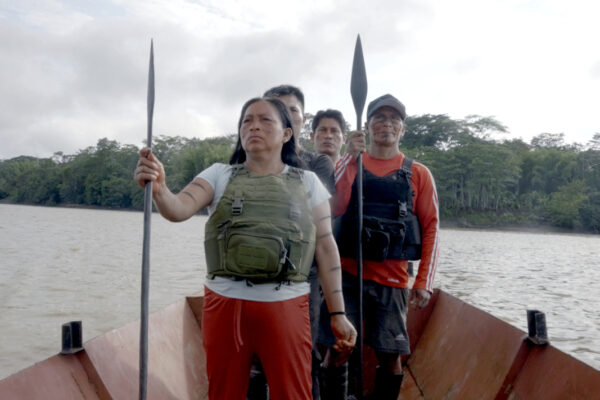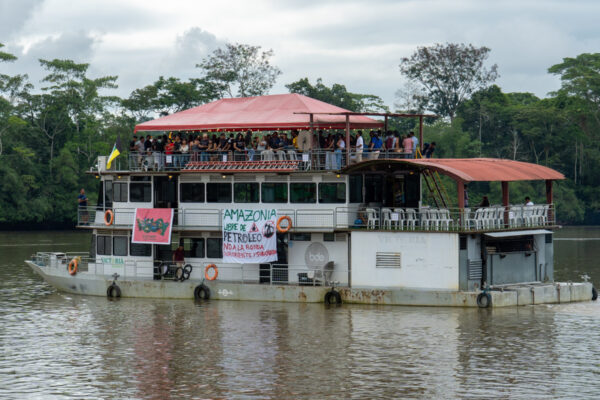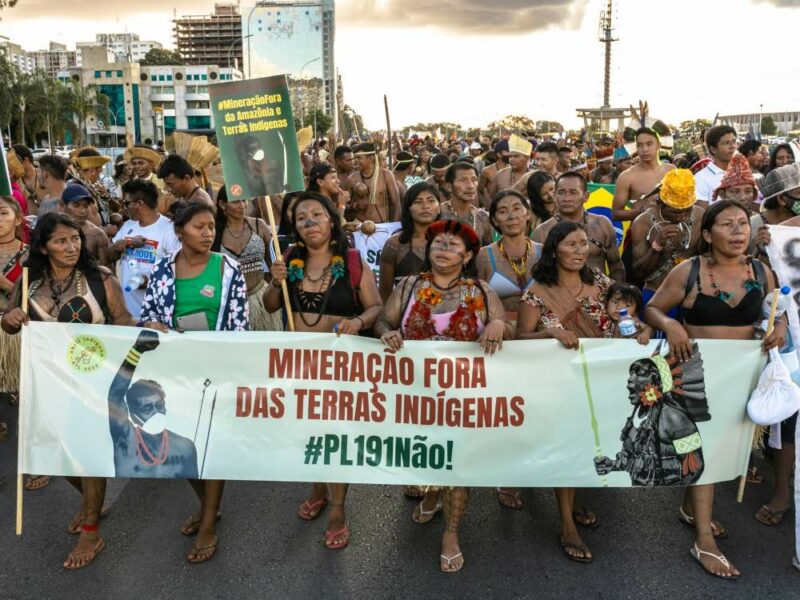
Last Saturday, the government of Pará (along with other Amazon governors) signed a Memorandum of Understanding (MOU) with the LEAF Coalition to boost actions regarding sustainability and the bio-economy. The LEAF Coalition is a public-private fund that aims at “providing finance for tropical and subtropical forest conservation” through carbon credits. While hailed by its advocates as an innovative step forward in halting deforestation, there are serious greenwashing concerns regarding the effort. Among its funders are some of the largest corporations (and polluters) in the world, such as Amazon, Nestle and even BlackRock.
We joined other civil society organizations and drafted a letter to governments involved in this agreement – including the U.S. government – to raise concerns about Para’s true capacity to honor such agreements, in the face of such an aggressive extractivist approach. The speed at which the local government has tried to approve large extractive and infrastructure projects, with immense impacts on deforestation, loss of biodiversity and indigenous and traditional communities, contradict the promises of a green economy bolstered at COP26. The letter raises the example of the Belo Sun mining, a large gold mining project in the heart of the Amazonas an example of how predatory projects are swiftly advancing.
We question Para’s government attempt to greenwash its agenda, while it practices one of the most aggressive extractive policies in the country. At COP26, the letter was delivered to representatives of countries involved in these agreements (Norway, UK, and Germany), by Marinor Brito, a deputy from PSOL at COP26, along with some of our coalition partners, such as International Rivers.
Letter of concern about the “Green Policy” of the state of Pará
The civil society organizations below are, by means of this letter, expressing concern about the progress of agreements between governments funding the LEAF Coalition and the German Cooperation-GIZ, and the state of Pará aiming at raising funds for environmental preservation. Given the current economic development policy consolidated by the state government, we question its real intention and capacity to comply with such agreements, should they come to fruition.
Recently, a series of cooperation initiatives between the states of the legal Amazon and international partners were disclosed to direct resources to production chains focused on the regional bioeconomy. Among them is the signing of a Memorandum of Understanding between the Amazonian states, the German Cooperation-GIZ and the LEAF Coalition for “financing projects to combat deforestation and forest conservation”. The signing of the cooperation agreement should take place during the COP26, on November 6, at the Brazil Hub in Glasgow, Scotland. However, there is no further information on the content and provisions of the agreement beyond the announcements echoed by the press.
In the further sections we will present the reasons why we affirm that the government of the state of Pará has not adopted practices consistent with its promises. On the contrary, by openly supporting projects of high social and environmental impacts in the region (described below), it will not be able to honor its commitments to reduce deforestation and greenhouse gas emissions.
Promises of a green policy
In recent years, Governor Helder Barbalho has been advertising the state of Pará as a leading Brazilian state in green policies and sustainable development in Brazil. In order to obtain resources, several government promises are being advertised as major advances in the preservation of the biodiversity of the Amazon forest.
Among these promises are:
a) the creation of the State Plan Amazônia Agora (decree 941 of August 3, 2020), as the main instrument of Pará to try to prove its commitment to Race to Zero (neutrality of carbon emissions until 2050), and to prove an alleged decrease in deforestation rates in the state. Both the governor and his government officials have announced ambitious goals regarding the end of deforestation and carbon emissions. At Climate Week, in New York, Governor Helder Barbalho promised to guarantee “zero net deforestation by 2036″, and his Secretary of State for Environment and Sustainability even affirmed the ambition that by 2026 Pará be a zero net emitter of greenhouse gases, carbon neutral.
b) The delivery of a state bioeconomy strategy. Promised until COP 26, the decree published by the Pará government only establishes the conditions for the development of this strategy in the next 12 months, with the creation of a working group. Besides not representing a significant advance, compatible with the climate emergency we are facing, the document does not even determine what kind of activities are considered “sustainable”, does not privilege the traditional economic development of the Amazonian native peoples, and attributes disproportionate powers to the State Secretary of Environment (SEMAS), to the detriment of the other participants in the working group. The Secretariat is also responsible for chairing the Management Committee of the State System on Climate Change, which monitors the state bioeconomy policy, in addition to managing the Pará State Bioeconomy Small Producer and Industry Guarantee Fund (FGPPIB), also known as BanPará Bio .
We see with great concern that the only state environmental agency with the competence to attest to the socio-environmental viability of projects will accumulate the functions of planning and monitoring the State Bioeconomy Plan and the State Climate Change Plan. The monopolization of all the tips of the economic activities considered by the government as “bioeconomy” creates a conflict of interest for SEMAS, since it becomes the agency responsible for creating the budget allocation, defining priority activities, and approving their respective impact studies. We urge the need for the body evaluating activities harmful to the environment and the population to be impartial and premised on environmental protection and guaranteeing the human rights of traditional populations.
In turn, we emphasize that the Amazônia Agora State Plan (Decree 941 of August 3, 2020) also does not include concrete parameters for its implementation. Despite establishing specific targets for GHG reduction, the Plan does not explain how this reduction will be achieved, and if those targets are not met by 2036 there will only be a reformulation of new strategies, with no provision for any type of sanction or remediation.
None of the aforementioned decrees have been turned into law.
Setbacks and gaps in Pará’s current environmental practice
The above examples show that despite numerous promises, the Pará state government’s commitments remain vague, and offer no concrete evidence on how the state will reverse its fifteen consecutive years of leading Amazon deforestation, including the current year.
This context becomes even more serious in light of the fact that Pará continues to give centrality to the same predatory development model that led us to the current climate emergency. Year after year, the state invests in and approves projects whose socio-environmental impacts put at risk the very survival of the Amazon biome, its indigenous peoples and traditional communities.
We draw attention to a major project whose accelerated approval by the Pará environmental agency highlights the weight of this economic development policy: the Volta Grande Project, which is intended to be the largest open-pit gold mining operation in the heart of the Volta Grande do Xingu.
The Volta Grande Project, of the Canadian company Belo Sun, is a major threat from a social and environmental point of view. The project aims to be installed in an environmentally sensitive area that is already suffering from the reduction of the water flow of the Xingu River as a result of the installation of the Belo Monte hydroelectric plant, which diverted the river from its natural course to generate electricity. Today, the region of the Volta Grande is experiencing a situation of total socio-environmental collapse with the loss of its aquatic ecosystems, loss of navigability of the river, loss of fishing and loss of the ways of life of traditional populations that reside there and currently living in food insecurity. Allowing the implementation of a gold mining company, which will use chemical processes, explosions and construction of a tailings dam, all on the banks of one of the tributaries of the Amazon River constitutes ecocide.
Without respecting the principles of precaution and prevention and in violation of the due process for environmental licensing, the environmental body of Pará approved the Environmental Impact Study (EIA) and ensured the supposed environmental viability of the enterprise without conducting Impact Studies regarding indigenous and riverine peoples and without free, prior and informed consultation with the traditional peoples of the Volta Grande do Xingu. Despite seven lawsuits and all the warnings and resistance to this absurd project, the State of Pará insists and pressures for the advancement of the licensing of the mining company even with clear evidence of flaws in the methodology of the studies, the absence of studies of synergistic and cumulative impacts with Belo Monte and the very high environmental risks due to the engineering of the project. Even so, one of the lawsuits obtained the suspension of the Installation License of the project, which is valid until today.
One of the main risks of the project is the rupture of the tailings dam, which could turn the Xingu River into the new Doce River of Brazil, destroyed after the biggest socio-environmental disaster caused by the Samarco mining company. Several renowned researchers and experts have been criticizing and pointing out gaps and flaws in the studies and raising questions that the State of Pará has never answered. Even the federal regulatory agency, the Brazilian Institute of the Environment and Renewable Natural Resources (IBAMA), has already stated that no other undertaking in the Volta Grande is recommended as a result of the impacts and monitoring of Belo Monte and, in 2019, the Federal Public Prosecutor’s Office (MPF) sent a Recommendation to the governor of Pará and the state secretary of the environment to suspend all environmental licensing processes for activities with significant potential for environmental degradation in the Volta Grande do Xingu. The suspension should be maintained until the testing period planned for the region is concluded or the capacity of the local ecosystems to support the diversion of water carried out for the generation of energy from the Belo Monte dam is confirmed.
In addition to the authorities’ failure to follow the Public Ministry’s recommendations, there is evidence that the company itself is not even complying with the court decision that suspended its installation. Despite the legal prohibition to enter the territory, Belo Sun already acts in control of the area, with the installation of signs and fences in areas of its alleged property, curtailing access to areas of collective planting and the riverbanks, in addition to intimidation and coercion of local communities through a private security company. None of the abovementioned violations, amply documented by the State Public Defender’s Office, in addition to local resistance to the project and the serious gaps regarding the environmental viability of the enterprise, have been taken into account by the State of Pará, which insists on proceeding with the licensing that has been approved by SEMAS.
The posture of the main regulatory body for this enterprise, responsible for assessing, inspecting and monitoring its immense socio-environmental impacts, has been to prioritize the enterprise to the detriment of the biomes and populations affected. It is extremely worrying that this is the same body responsible for managing bio-economy plans, protection against deforestation and the climate crisis.
Conclusion
For all the above, we urge governments and companies willing to do business with the Brazilian state of Pará to act responsibly with their investments.
It is not a green policy without respect for the territorial and cultural rights and way of life of traditional communities. Therefore, we emphasize that the current practice of the state government’s environmental agency, SEMAS, goes against the promise of environmental management that is concerned with the environment. It is known that approximately 45% of intact forests in the Amazon Basin are in indigenous territories, so that SEMAS should be required to act in a way that integrates environmental conservation with the maintenance of the way of life of Amazonian communities.
On the other hand, we pay attention to the fact that there is no “green development” without the inclusion and participation of Amazonian communities. The inclusion of traditional knowledge is an essential requirement of any attempt at bioeconomy in the Amazon, besides being a right provided for in article 7 of ILO Convention 169. It is the Government’s responsibility to ensure the participation of the population in the formulation, application and evaluation of national and regional development plans and programs susceptible of directly affecting it, in respect for the Federal Constitution and all international treaties and conventions of which Brazil is a signatory.
In relation to the promise of emissions reduction connected to the Amazônia Agora state plan, we urge that already formalized conservation units do not be “reused” to justify a reduction in GHG gases, but rather that only new protected areas be accounted for in order to demonstrate real reduction. Following the example of the Triunfo do Xingu APA, the most deforested protected area in the Amazon, under management of the government of Pará, the mere creation of a creation unit does not always result in effective forest protection.
Finally, in relation to the commitment related to the creation of a carbon credit, linked to the Amazonia Now State Plan, we urge that any monetization of environmental conservation be linked to concrete actions aimed at regulating predatory activity in the forest. The protection of the Amazon cannot become a bargaining chip for the benefit of large industries.
Considering that it is fundamental that the resources to the State of Pará fulfill their real purpose, and in view of the interest in contributing to the preservation of Amazonian biodiversity and the reduction of GHG emissions, we recommend that States and organizations link their resources to:
- Obligation to evaluate the emission of GHG gases of all projects in the licensing phase, based on Article 21 of the State Policy on Climate Change, and on the emission reduction targets of the State Plan Amazônia Agora;
- Obligation to carry out Free, Prior and Informed Consultation to the traditional peoples and communities in the conception and planning phase of socioeconomic and infrastructure development guidelines and projects and respect for all the principles of ILO Convention n. 169;
- Inclusion of representatives of the Amazonian communities in the working groups and management committees of the new Bioeconomy Strategy in equal or greater proportion to the representatives of state agencies and private initiative;
- Implementation of a Strategic Environmental Assessment (SEA) in regions with traditional communities impacted by two or more projects, as per the UNEP report on global best practices in SEA, and the Protocol on Strategic Environmental Assessment of the Espoo Convention, where applicable.
Signatories
Inter-American Association for Environmental Protection (AIDA)
Xingu Vivo para Sempre Movement
Amazon Watch
International Rivers
Comitê pour les droits humains en Amérique latine (CDHAL)
Socio-environmental Institute (ISA)
MiningWatch Canada
Earthworks
With the support of
Mandate of State Deputy Marinor Brito – PSOL-PA
Mandate of Federal Deputy Vivi Reis – PSOL-PA













